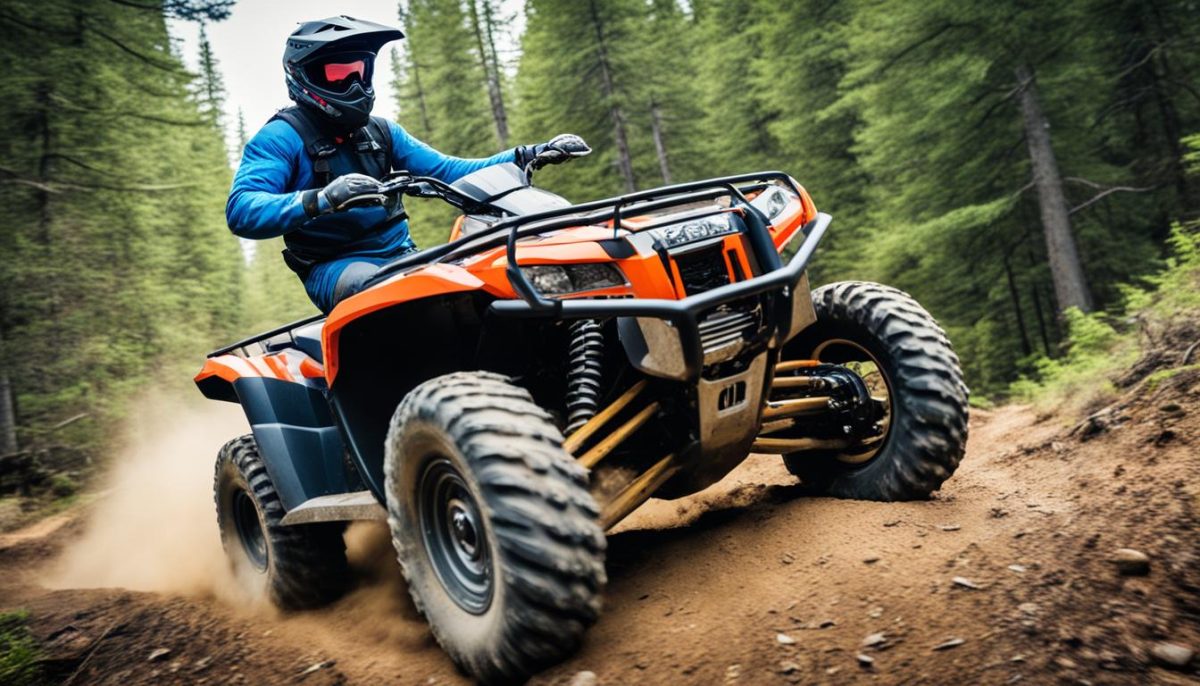Welcome to our article where we will explore the key distinctions between ATV trails and OHV trails. If you’re an off-road adventure enthusiast, knowing the differences between these types of trails is essential for planning your next exhilarating outing. Whether you prefer the power and agility of an ATV or enjoy the versatility of other off-highway vehicles (OHVs), understanding what sets these trails apart will ensure a memorable and enjoyable experience.
Are you ready to dive into the world of ATV trails and OHV trails? Let’s begin by discovering what makes each type of trail unique and how they cater to different off-road vehicles. From designated ATV paths to expansive multi-use OHV trail systems, we’ll cover it all. So, fasten your seatbelts and let’s embark on this thrilling journey together!
ATV Trails
ATV trails are specifically designed for all-terrain vehicles (ATVs). These designated trails provide a thrilling off-road adventure for ATV enthusiasts. Located in recreational areas, parks, or designated trail systems, ATV trails offer narrow and winding paths that cater specifically to the needs and capabilities of ATVs.
Adventurers can expect a variety of terrains along ATV trails, including muddy tracks, sand dunes, rocky paths, and even wooded areas. Each trail offers a unique experience, allowing riders to navigate through diverse landscapes and tackle different challenges.
These trails are primarily designed for off-road use and are typically not accessible to other types of vehicles. This exclusivity ensures a safe and enjoyable riding environment for ATV enthusiasts.
The Benefits of ATV Trails
ATV trails provide several benefits for riders:
- Optimized Riding Experience: With their specialized design, ATV trails are tailored to maximize the capabilities of all-terrain vehicles, ensuring a smooth and enjoyable ride.
- Increased Safety: By limiting access to ATVs only, ATV trails minimize potential conflicts with other vehicles and promote rider safety.
- Preservation of Natural Areas: Designated trails reduce the impact on surrounding ecosystems by confining riding activities to specific paths, preserving the natural beauty of the area.
- Opportunities for Skill Development: ATV trails of varying difficulty levels provide riders with the chance to challenge themselves, improve their skills, and progress as off-road enthusiasts.
| ATV Trails | Benefits |
|---|---|
| Specifically designed for all-terrain vehicles (ATVs) | Optimized riding experience |
| Located in recreational areas, parks, or designated trail systems | Increased safety |
| Offer narrow, winding paths catering to ATV capabilities | Preservation of natural areas |
| Feature diverse terrains and challenging landscapes | Opportunities for skill development |
OHV Trails
OHV trails offer a thrilling off-road experience for enthusiasts of various off-highway vehicles. These multi-use trails cater to a wide range of vehicles, including ATVs, dirt bikes, side-by-sides, and other off-road vehicles. Unlike ATV trails, which are designed specifically for ATVs, OHV trails provide a larger and more diverse riding experience.
OHV trails are known for their expansive network of interconnected routes, offering riders the opportunity to explore different terrains and difficulty levels. Whether you’re a beginner or an experienced rider, OHV trails provide options for everyone.
These trails are typically found in larger off-road areas, national forests, or designated OHV parks. They provide a sense of adventure, allowing riders to connect with nature while enjoying the thrill of off-road exploration.
If you’re looking for a versatile and exciting off-highway adventure, OHV trails are the perfect choice. Get ready to conquer rugged terrain, experience adrenaline-pumping rides, and create unforgettable memories with your fellow off-road enthusiasts.
Benefits of OHV Trails:
- Accessible to a wide range of off-highway vehicles
- Provides diverse terrains and difficulty levels
- Interconnected network of routes for exploration
- Located in larger off-road areas and national forests
- Offers an exhilarating and immersive off-road experience
| Feature | ATV Trails | OHV Trails |
|---|---|---|
| Designed for | ATVs | Various off-highway vehicles |
| Terrains | Narrow paths catering to ATVs | Diverse terrains for multiple vehicle types |
| Trail Size | Smaller, focused areas | Larger, expansive networks |
| Difficulty Levels | Varied levels based on ATV capabilities | Different levels for varying skill levels |
| Accessibility | Restricted to ATVs | Accessible to a wide range of off-highway vehicles |

Key Differences Between ATV Trails And OHV Trails
When it comes to off-road adventures, understanding the difference between ATV trails and OHV trails is essential. These trail designations and vehicle access can significantly influence your riding experience. Let’s dive into the key differences between these two types of trails.
ATV trails are specifically designed for all-terrain vehicles, providing a thrilling experience for ATV enthusiasts. These designated trails cater exclusively to the needs and capabilities of ATVs. With narrow and winding paths, ATV trails offer riders a challenging and enjoyable ride. While ATV trails may feature various terrains like muddy tracks, sand dunes, or rocky paths, they are typically restricted to ATVs only. This exclusivity ensures a smooth and uninterrupted adventure for ATV riders.
On the other hand, OHV trails offer a more diverse off-road experience, accommodating a wide range of off-highway vehicles. These multi-use trails are not limited to ATVs but also welcome dirt bikes, side-by-sides, and other off-road vehicles. OHV trails often encompass larger areas and interconnected networks of routes. This allows riders to explore and discover new paths, providing a sense of freedom and adventure. With different difficulty levels, OHV trails cater to riders of varying skill levels, making it accessible to all off-road enthusiasts.
In summary, while ATV trails are exclusively designed for ATVs and restrict access to other off-highway vehicles, OHV trails accommodate a wider range of vehicles and provide a more expansive and interconnected trail experience. Whether you prefer the exclusivity and focused challenges of ATV trails or the versatility and exploration offered by OHV trails, there is no shortage of excitement and adventure waiting for you on these off-road trails.

